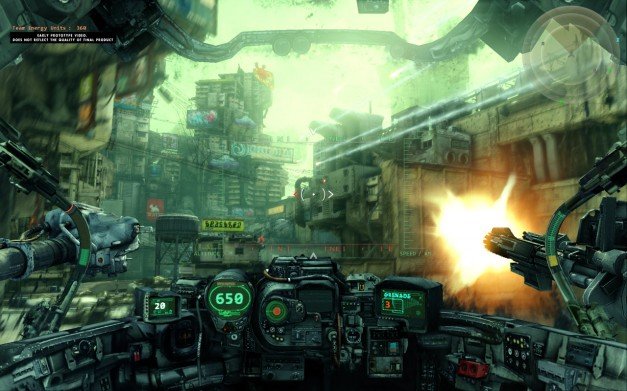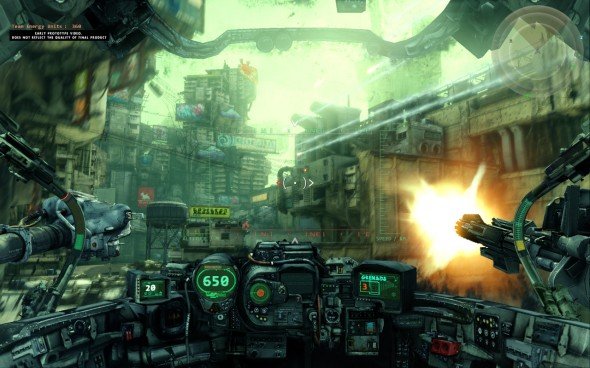Hawken interview: the indie team behind the best mech game we've seen

We've had a day for our jaws to return to their normal configuration after yesterday's trailer for mech FPS Hawken knocked us out of our nerd chairs . After we picked up all the Cheetos, we got in touch with the nine-person team at Adhesive Games to ask a few questions about what mech games inspired Hawken and how such a modest crew produced something so lustworthy.

Evan Lahti: Not to be flattering in front of all our readers, but your footage is goddamned brilliant. Hawken looks bright but post-apocalyptic; the robot fighting seems as speedy as another modern FPSes. How on Earth did nine of you produce this in nine months?
Jon Kreuzer, Technical Lead at Adhesive Games: Haha, thanks for the flattery. It was nine months, but actually less than nine people for most of that time. Our studio is now up to nine people including interns. We have some talented artists and have stayed focused on our core game. Many parts of the levels are created by combining re-usable building blocks into unique structures, which can allow new levels to come together quickly. We don't have the resources to develop an engine from scratch so we started with UDK [Unreal Development Kit] which turned out to be an excellent choice.
EL: Where are you guys based?
JK: We are based in the Los Angeles, California area. We have a studio that we're all working at every weekday.
EL: Can you talk a little bit about your background as developers, artists, or other roles held by your staff?
JK: The four founders of Adhesive Games met while working on Project Offset . None of us were Project Offset founders, though. Most of us have been involved in the game industry and worked on our own projects but I have to admit we haven't shipped a major title before. Our lead artist Khang Le has an impressive resume of movie credits.
Keep up to date with the most important stories and the best deals, as picked by the PC Gamer team.
EL: The mech game genre has a lot of variation in how mobility (armored suits/exoskeltons vs. slow, walking tanks) influences the design of the game's mechs and therefore the design of gameplay itself. If we create an imaginary spectrum with, say—MechWarrior's slow-moving, torso-rotating hulks at one end and something like Front Mission's more mobile Wanzers at the other (with Gundam, Chromehounds and other games scattered in-between), where would Hawken fall?
JK: In Hawken we want the Mechs to feel fast and responsive but also heavy. I would describe the gameplay itself is fast-paced. Some controls like turn speed won't be as fast as a typical FPS with human characters. I'm not familiar enough with all the games mentioned to give a good comparison.
EL: What kinds of mechanics (heat management, slower pace, torso rotation) from MechWarrior—if any—do you think wouldn't work today in a game with mechs?
JK: The mech audience seems to be split between people who like slower (possibly more realistic) mechs and those who want faster and easier to control ones. I think there's room for both although our games lean more towards the latter category without sacrificing the sense of weight. We do have overheating on weapons but not movement.
EL: What games—in the mech genre and elsewhere—do you consider as inspiration for Hawken?
JK: MechWarrior for the weight and suspense, and Virtual On for the arcade style action. Our development process however is mainly to just try stuff out from a wide range of inspirations and see what works.
EL: Back to the art direction—the trailer gives me the sense that you're creating a futuristic world that's rough around the edges, but never dips completely into feeling apocalyptic in the clichéd sense. How would you describe the setting?
JK: The world does resemble a post-apocalyptic setting but we wanted it to feel more like somewhere that was once vibrant rather than always destroyed. In the current video the levels are empty except for the battling mechs, but we plan to add some moving background elements or creatures to make the world feel more alive. There will also be more levels than the three in the trailer, some of which have their own unique feel.
EL: Are you seeking a publisher, or hoping to remain fully independent?
JK: Right now we hope to remain independent and are not seeking funding from publishers. We are open to working with publishers and other companies if the right deals come along.
EL: If everything went your way, what impact would you want Hawken to have on the FPS genre?
JK: We're just hoping to release a unique mech combat experience. We think there's room in today's market for a good solid fun mech game.
EL: At the moment, you're not sure what platforms Hawken will release on, but you're hopeful that it'll be available on as many as possible. Is it more likely to end up on PC than Xbox 360 or PS3?
JK: At this point we really have no idea. Ideally we would like to release at some point on all three platforms. We haven't really started on the business side of things yet.
EL: Thanks for your time, Jon.

Evan's a hardcore FPS enthusiast who joined PC Gamer in 2008. After an era spent publishing reviews, news, and cover features, he now oversees editorial operations for PC Gamer worldwide, including setting policy, training, and editing stories written by the wider team. His most-played FPSes are CS:GO, Team Fortress 2, Team Fortress Classic, Rainbow Six Siege, and Arma 2. His first multiplayer FPS was Quake 2, played on serial LAN in his uncle's basement, the ideal conditions for instilling a lifelong fondness for fragging. Evan also leads production of the PC Gaming Show, the annual E3 showcase event dedicated to PC gaming.

